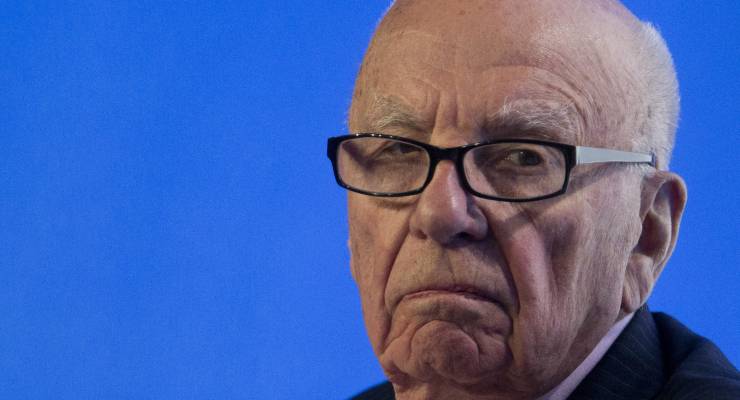
When the journalists at News Corp saw reports that Lachlan Murdoch had acquired a new family home in Los Angeles for $218 million last December, they might have felt a sense of career security that comes from working for a highly profitable company with an overtly prosperous controlling shareholder.
No longer. Over the past few weeks, News Corp has announced the closure of 125 regional newspapers, the elimination of a quarter of Australia’s print dailies, the shuttering of most of this country’s suburban newspapers, and the retrenchment of hundreds of staff across its city newspapers.
The decision to decimate a large slice of Australia’s regional and suburban journalism wasn’t made in rural hamlets like Chinchilla or Caboolture, or suburbs like Parramatta or Preston, where local news coverage will either disappear or be scaled right back.
It was announced from corporate head office in Sydney, where the company website proclaims its pride in “our heritage of connecting communities to the stories that matter … we are the voice of everyday people, a champion for the battlers of Australia”.
That spin was also embedded in the company’s announcement of its 125 newspaper closures.
“Let me be clear from the outset: News Corp is not turning its back on Australia’s regions and communities,” wrote executive chairman Michael Miller in the company mouthpiece The Australian. “Nothing could be further from the truth: we remain their greatest advocate — they are what makes our country great.”
The script for Miller’s ritual commitment to altruistic public service journalism was initiated decades ago in Sir Keith Murdoch’s will. Dated January 21 1948, it laid out his expectation that his son Rupert “should continue to express ideals of newspaper and broadcasting activities in the service of others and these ideals should be pursued with deep interest”.
Those grand ideals sit in stark contrast to the announced closure last month of those (mainly free) newspapers which will be replaced by vastly scaled-down, paywalled websites employing hundreds’ fewer journalists across regional and suburban Australia.
If public interest journalism was just another product, especially in regions and suburbs where there is only one publisher of a “product” that is central to a democratic informed society, it could be argued that acting purely commercially — as News Corp has done — is entirely appropriate in a free marketplace.
But not all products are equal. If the Australian Competition and Consumer Commission, the corporate regulator, really believes what it says about news journalism — that it’s a “public good, important for democracy” — why hasn’t it intervened in the culling of Australian community journalism at the hands of News Corp, a $10.3 billion foreign-owned media company?
Why hasn’t it stepped in, as it did recently when major shareholders News Corp and Nine Entertainment announced the closure of Australian Associated Press, the country’s only wire service? In that case, the ACCC launched an inquiry that effectively put the owners on notice that it wouldn’t countenance AAP being shut down if there was a legitimate buyer. As there was.
With a few weeks to go before their closure, it isn’t too late for the ACCC to repeat that intervention and launch an investigation to determine whether there are genuine buyers for at least some of the newspapers being shuttered by News Corp.
This strangulation of Australian local news is laced with sadness and irony. It sees the arc of a media journey — beginning with Rupert Murdoch’s inheritance of the now-defunct Adelaide News from his father’s estate in 1952 — reach its denouement in the uncertain hands of his son, Lachlan.
Without swift regulatory intervention, that journey will end up a long way from the “ideals of newspaper and broadcasting activities in the service of others” that Keith Murdoch optimistically predetermined for his own son.








Does the Corporations Act register newspapers ?
If it does then the Government should de register the Murdoch papers until they reinstate the regional and local free papers.
The ACCC should break up the Murdoch press monoplies, which they have in some states.
Traditionally many, maybe most, regional papers start from very humble beginnings and with all the journos out of work all over the country, there’s no reason for that process not to continue. Up here in the NSW Northern Rivers region almost all local papers will cease. One independent standout has for many years been the Byron Shire Echo and it is still going strong. It started as a humble A4 sized handout, but through the need for an independent local voice, has grown into a much loved print and online local chronicle.
Were the ACCC to get involved to breathe life into stodgy old carcasses with out of date practices, they might not be doing locals a favour. Maybe it is time let the old papers go and give a new generation with new ideas a chance to form their own news media. Anyone who wants to see what success in the modern print/online media era looks like check out echo dot net dot au.
Agree that the Echo is a standout with a huge range, as far as Casino in cocky country and free.
Similarly, in Orange, the editor of the closing NewsCrap franchise has begun a new, truly local & independent free journal, in its fourth week now and well appreciated, to judge from the local ads. vehicles and private property sales.
I’m sure that the loss of these papers is terrible for journalism, but it’s the worst form of journalism, Murdoch journalism.
And while it is terrible, I’m not sure that it isn’t a great day for a pluralist democracy. The demise of the daily telegraph would surely be an advance for democracy in Australia, followed by The Australian, and with recent changes, the SMAge can probably follow.
Now, why wasn’t my phone allowing me to comment?